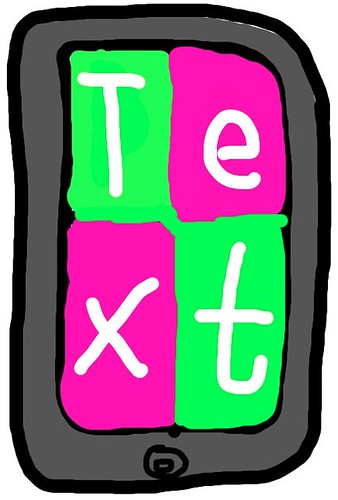It's amazing. There have to be perks in transition periods (not being in a class day-to-day) and attending the Speaks VOLumes online conference (http://pd.txvsn.org) is so inspirational. When I was in the class every day, I just ran out of time to keep up-to-date with everything that was happening. This can lead to distorted information / perception of bigger issues or misinformation. It was leading to a sense of isolation for me (especially when I was based within a special character environment with a MOI of te reo Maori). The investment of time required in the creation and translation of resources just did not allow time for social networking outside the immediate and close circle of specialised practitioners.

It's absolutely fabulous to have the time to hear about passionate and driven teachers who are blogging, writing and presenting about their experiences in their teaching and learning!
http://tzstchr.edublogs.org/ and http://coopcatalyst.wordpress.com/
 |
| Sorry, I squirrelled this years ago - might be from http://www.animationfactory.com/en/ |
http://tzstchr.edublogs.org/ and http://coopcatalyst.wordpress.com/
Then, listening to Dr. Bonk's presentation brought out my smiley face =)
See http://trainingshare.com/ to find out about this very enthusiastic and passionate presenter!
See http://trainingshare.com/ to find out about this very enthusiastic and passionate presenter!
 |
| 13 year old has been a teacher for over 1/2 of her life - Adora Svitak is recognised for doing what I believe all children are capable of. Fabulous!! |
ONLINE.
That is why it is a little sad for me to say that, while I shared as much as I could F2F, I wasn't uploading resources to share online. That has changed and will continue to change.
Tauihu - bilingual interactives with some basic vocabulary, for the body, for greetings and expressions, and for karakia.
Rehutai - some information literacy resources (in te reo Maori) and a database of school readers.
Wiggio - Not sure who else uses this, but would love to know how easy it is to share - http://newtonkura.wiggio.com has a social studies inquiry unit and some timetables, overviews and planners so far.
LearnCentral - http://www.learncentral.org/profile/cybersoul80#portfolio - has a couple of documents in te reo (around SGML and the origins of HTML, along with a layout drafting handout)
Flickr photostream - EOTC camp shots are it so far
Youtube (;P) - 2 clips so far, but fully in te reo Maori and more will come.
That is why it is a little sad for me to say that, while I shared as much as I could F2F, I wasn't uploading resources to share online. That has changed and will continue to change.
 |
| Te Rito - aimed at pre-schoolers |
Tauihu - bilingual interactives with some basic vocabulary, for the body, for greetings and expressions, and for karakia.
Rehutai - some information literacy resources (in te reo Maori) and a database of school readers.
Wiggio - Not sure who else uses this, but would love to know how easy it is to share - http://newtonkura.wiggio.com has a social studies inquiry unit and some timetables, overviews and planners so far.
LearnCentral - http://www.learncentral.org/profile/cybersoul80#portfolio - has a couple of documents in te reo (around SGML and the origins of HTML, along with a layout drafting handout)
Flickr photostream - EOTC camp shots are it so far
Youtube (;P) - 2 clips so far, but fully in te reo Maori and more will come.
On the other hand, as a casual teacher atm, integration of technology is limited. Not as a result of lack of experience, but by the fact that:
What I have managed to do is to, at the very least, incorporate aspects of digital photography into lessons and (if the technology is both in the room and accessible to us) utilise a combination of the resources I have gathered/created over the years on my external HDD with those resources I would normally use online -- in the sessions that I have with that class.
I am really looking forward to having my own class again. It'll be much easier to integrate both my old favourites and those mentioned on:
- there may not be a functioning computer or smartboard in the room
(sometimes a phone is as technological as it gets and I have seen blackboards recently) - casual staff don't have log-in access, let alone administrator rights
(so you have problems if the students can't log you in under one of their accounts, or if you are trying to access a site that requires a plug-in or viewer update) - social networking and social media sites are quite often blocked
(so it is a good idea to have a local backup of your delicious or diigo bookmarks and don't even try youtube or any web forums...) - any website may be blocked -it looks like the policy is to start by blocking everything and then to go through sites manually and decide whether the site should be unblocked. Make no assumptions that you will be able to access anything online...
What I have managed to do is to, at the very least, incorporate aspects of digital photography into lessons and (if the technology is both in the room and accessible to us) utilise a combination of the resources I have gathered/created over the years on my external HDD with those resources I would normally use online -- in the sessions that I have with that class.
I am really looking forward to having my own class again. It'll be much easier to integrate both my old favourites and those mentioned on:
- http://playingwithmedia.com/ (organised by type of media: text, sound, video...)
- http://www.slideshare.net/wfryer/filtering-the-information-flood-strategies-for-effectively-teaching-online (some great strategies and tools for strengthening information literacy here)
- http://publicationshare.com/ (Dr Curt Bonk - extensive list of resources =))
- http://remotedevice.net/project/ (Games in civics)

